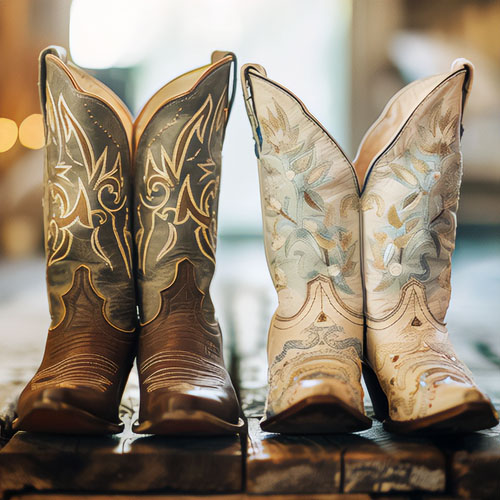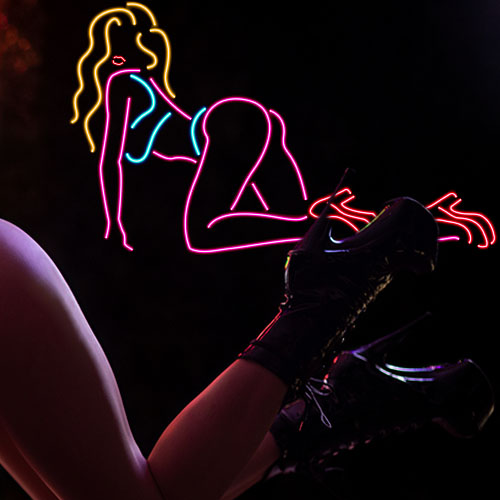Roll over, Mick Jagger! In today’s world of rock ‘n’ roll, it’s the girls who are making all the new waves.
Rock Queen: Ladies of The New Rock
Rock ‘n’ roll — the best rock ‘n’ roll anyway — has always been about sex. While — as in the real world — the male has seemingly dominated, it has been the artful snap of the female garter that has commanded every swaggering of that dominance. Enter the Rock Queen.
When there was Elvis, there was Wanda Jackson. A lot of people thought, and still think, that Wanda was as good a rock ‘n’ roll singer as Elvis. But in the late fifties, the public simply was not ready to accept a girl who looked and sounded as Wanda did. (And she looked and sounded as if she could fry eggs on her G-spot.) So, Wanda’s records did not sell; Teresa Brewer’s and Connie Francis’s did.
The situation changed. In the early sixties, the airwaves were full of songs by all-girl groups. Hips in crinoline and chiffon, hair teased in bouffant beehives, most of these groups were almost slavish, in a sly way, in their wet-mouthed subservience to, and gasping for the powers of cock almighty; the Shangri-Las pledging black-leather allegiance to “The Leaders of the Pack,” the Shirellles, waiting with legs crossed and diaphragm in abeyance for the return of “Solider Boy,” the Crystals saying it all, in 1962, when they swooned “He His Me(and It Felt Like A Kiss).”
The high-heeled foot of the eternal feminine was now in the door of the rock ‘n’ roll boys’ club. Women no longer sang in the choreographed unison about Christs in pegged pants. The party dresses and hairspray cans were tossed aside; tie-dyed blouses and long, flowing waves took their stead. The sigh that accompanied the girdle’s removal was loud. The Jefferson Airplane, Big brother and the Holding Company, and the Stone Poneys were the names of the bands, but Grace Slick steered the plan, Janis Joplin directed the company and Linda Ronstadt sat in the saddle.
By the middle of the next decade, there was Patti Smith. The old phrase “new wave” had not yet been applied to rock ‘n’ roll, but when it eventually was, Patti was embraced as its pale and thin-limbed androgyne queen. Violently new as her music and manner were, her way of thinking seemed to hearken back to the days of the girl groups. When asked, in a 1976 Penthouse interview, “Do you feel that girls want to get slapped around?” Patti calmly said “Yeah.”
As the eighties began, the queens of rock ‘n’ roll, low-cut and strapless or booted and gloved, seething sex as never before, seemed to be succeeding in doing what Crystals had really wanted to do — namely, hit back. Debbie Harry, of Blondie, Joan Jett (of the Runaways), and Chrissie Hynde (of the Pretenders), held the cocks of young America in their long-nailed fingers, squeezing harder as the music got louder.
But the new wave of rock, like the new wave of bill collectors, moved faster than ever before. These days, it seems that a rock queen is no sooner crowned than she is banished for the crime of being old hat. (“Joan Jett: Still Hot?” asked the cover line of a recent issue of Greem, hinting that her fashion sense, not to mention the pilot light of her G-spot, might already be flickering out.)
To keep up, and to keep it up, herewith are some of the hottest of the newest. So how do you want your eggs, kid?
By far, the most famous and most successful of the lot are the Go-Go’s. Irresistible in their baby-fat innocence — the blond lead singer, Belinda Carlisle, will most likely be regarded as jailbait well into her menopausal years; and drummer Gina Schock looks as if she really can’t decide whether Certs is a candy mint or a breath mint — these five girls differ from most other new-rock groups in that they smile rather than frown. And not the smile of Mona Lisa, theirs; but rather the smile of sublime and eternal girlishness, the secret of which they seem to have stumbled upon somewhere between their high-school parking lot and the First National Bank of Los Angeles.
Painting their toenails on the cover of their first I.R.S. album, water-skiing (in choreographed unison, I might add) on the cover of their second, and making music that is a perfect accompaniment to both those activities, these girls have got what it takes. I mean, could Mona Lisa have gotten away with “Beatnick Beach”?
More than anything else, the Go-Go’s demonstrate that in times of great sleaze clean can be sexy. Pass the Ivory, Belinda.
A group called Berlin, founded and led by the young composer John Crawford, lies at the farthest perimeter of S & M rock. (This is saying a lot. So much of the new rock is imbued with the sensibilities of sadomasochism that it can be said with certainty that if Leopold von Sacher-Masoch were alive today, he’d surely be watching MTV.) Though Crawford is the force behind Berlin, the person at its center is a lewdly lovely young creature named Terri Nunn.
On the back of Berlin’s Geffen album, Pleasure Victim, Terri Nunn’s credit reads “Vocals, BJs.” The vocal part of that credit is utilized on such songs as “Torture” (“Torture, torture, twisted love/ Kiss me, kick me, feel my blood”), “World of Smiles” (“I’m laughing/ Hurt me, hurt me”), and the quite remarkable “Sex (I’m a…),” the only song that she helped write. To the repeated plaint of “I’m a man,” Nunn answers variously, “I’m a bitch,” “I’m your mother,” “I’m your slave,” “I’m a little girl,” “I’m a virgin,” “I’m a goddess,” “I’m a slut,” and “I’m a dream divine.” If it were possible to judge by the way Terri Nunn sings, and by the way she looks, I would say that all of those things are probably true. How she is as far as “BJs” are concerned, I venture we’ll have to ask around.
The members of Girlschool, on the other hand, definitely don’t smile; nor do they water-ski in their rock queen quest. Tending towards leather, chains, spiked collars, gold-lame mini-skirts, leopard skins, and black mesh stockings, singer-guitarists Kelly Johnson and Kim McAuliffe, drummer Denise Court, and bass player Enid Williams are Londoners who possess what might be called a negative attitude. The women-in-chains cover of their Mercury album, Screaming Blue Murder, is as theatrically staged as a Times Square S & M show, but the music inside (most of it written by Johnson and McAuliffe) proves that these skinny-legged, sneering bitches are, deep down, skinny-legged, sneering bitches with souls.
To Girlschool, love and sex are not particularly romantic matters. Forsaken paramours are left “slithering in a sea of flesh and blood” (“Flesh and Blood”), told that “the lines on the mirror are showing up on your face” (“Take It From Me”), and — best of all — warned with relish that “all your nightmares will come true” (“When Your Blood Runs Cold”).
“So much new rock queen is imbued with the sensibilities of sadomasochism that it can be said that if Leopold von Sacher-Masoch were alive today, he’d be watching MTV.”
One can only imagine what these girls will be like when school is out. We have, indeed, come a long, long way since “Our Miss Brooks.”
Another group controlled by a man and fronted by a woman is the Waitresses. Chris Butler, who leads the six-member group from Cleveland, has been quoted as saying that “a man writing for a woman equals a universal.” Such incredibly silly and pompous twaddle should not stand in the way of anyone’s getting a kick from the Waitresses. In spite of the unsmiling Mr. Butler’s sophomoric pretensions, the band is one of the cutest acts to be heard in recent years.
Patty Donahue, the lead singer for the Waitresses since its start, was marvelously jaded and petulant in her role as the Madame LaZonga of the new wave. Attired in the sort of ill-fitting formal wear that certain women named Rosie were once fond of, she performed songs such as “I Know What Boys Like” (the nouveau biche anthem that was a jukebox and an FM hit in 1981) and “Pussy Strut” with just the right mixture of throaty purring and awful nasal whining.
Most audiences and critics, though, perceived her as sounding too bored. In May 1983, after recording the Polygram album Bruiseology, Patty left the group and was replaced by Holly Beth Vincent, a strange and fair young lady who had formerly been the leader of her own band, Holly and the Italians. The universal, as they say in the realm of the frown, sashays onward.
Lifting much of the musical notion from the late, lamented girl group called the Slits, Malcolm McLaren, who is sort of the Col. Tom Parker of the new wave, devised “tribal rock” and its leading proponents, Bow Wow Wow, in one fell and lucrative swoop.
At the heart of Bow Wow Wow’s wardrum dance music is a little British rock queen teenager called Annabella. She has a sweet, honestly pretty voice — something rarely encountered in these musical parts, where mellifluousness is a failing — and while Bow Wow Wow’s lnjun shtick is often as comical, in an unmeant way, as Claudette Colbert’s straight face in Drums Along the Mohawk, Annabella renders it more than a bit irresistible. (And lines such as “Mario was half-breed man,” “Sitting alone in my tepee,” and others on the band’s latest RCA album, When the Going Gets Tough the Tough Get Going, do indeed demand a lot to render them irresistible.) The conventionality of Annabella’s prettiness, though, does not extend beyond her voice. It must not be easy being the world’s most visible female exemplar of the Mohawk haircut. One wonders if the cuffs match the collar. Come on — a my tepee, come on, come on.
In a class unto themselves are the three British ladies — Siobhan Fahey, Sarah Dallin, and Karen Woodward — who call themselves Bananarama. Not since the girl groups of the early sixties has such a commanding erotic power been cast by painted lips. Far from being polished artists (in their early days — way back in 1981 — they were known to bump into one another onstage with all the awkwardness of drowsy PMS sufferers), the girls of Bananarama have, nonetheless, that certain unforgetable mien, that counterpoint of eye and hip that has been the mark of great broads throughout history.
All loose rhythms and lush, merged voices, their songs range from the luridly absurd, like “Aie a Mwana,” to the simply fine, like “Boy Trouble” and “Hey Young London.” (The last contains the group’s wry observation of the new-wave club scene: “The girls are young, but they act so old.”) Their choice of older material is impeccable; their version of Steam’s 1969 “Na Na Hey Hey Kiss Him Goodbye,” on their London Deep Sea Skiving album, outdoes the original by a grunt, a slurp, and two belly moans. May their breasts never sag and their spines never fail them in their quest for fortune and painless dentistry.
Now that Patti Smith is a housewife and mother (as they say in the fabric-softener commercials) living in relative quiet and anonymity in the Midwest, we have Patty Smyth, the lead singer of a quintet called Scandal.
Scandal’s ascent to fleeting fame happened so quickly last spring — the fast-lane pop media, usually vigilant, barely saw Scandal coming out of the corners of their Bette Davis eyes — that the group was for a spell the mystery of the year. Their Columbia single “Goodbye to You” (written by guitarist Zack Smith) has been one of the biggest, if also one of the less daring, new-rock hits; and the EP that contains it, Scandal, has done remarkably well competing against full-length LPs on the album charts.
Far more appealing to some than “Goodbye to You” are Miss Smyth’s legs (much better than Patti’s). Seeing her hike her skirt on the “Goodbye to You” video-cassette is nothing less than an inspirational experience. Art is long, but nothing works like a good depilatory.
A movie called Viva Italia! came over from the other side a few years ago. In one of its scenes, a chanteuse of questionable talent sang on a nightclub stage while her seedy husband-manager stood across the room at the bar, gesturing to his meal ticket and agitating customers with comments like “Christ, what a voice, huh? And look at those tits! Tell the truth, wouldn’t you love to fuck her?”
Seeing the band Missing Persons somehow brings to mind that wonderful Italianate vignette: Terry Bozzio, an alumnus of the Frank Zappa organization and the guiding force of Missing Persons, sits magisterially at the drums while his beautiful blond wife, Dale Bozzio, barely clad — her lavish breasts encased in clear plastic — bumps, grinds, and sings to the best of her ability.
The formula seems to be a successful one. Missing Persons has produced the highest-selling EP in the history of the recording industry, and its Capitol album Spring Session M is already a classic of sorts. As to what Dale Bozzio is singing — stuff her husband has fashioned in the Zappa style (“The man has to pooch the woman to present the child”) or lifted from other sources (“music down a windy street,” from Burroughs’s The Ticket That Exploded) — does it matter?
No plastic breastplate for Mari Wilson. Of all the new-rock ladies, this twenty-six-year-old Londoner is perhaps the most genuinely perplexing. Possessing the sort of classically alluring face that directors used to look for, Mari Wilson wears a beehive hairdo, satin gloves, rhinestones, and such-all with class and care, and nary a trace of camp or sarcasm.
The same class and care are to be found in her music. Mari’s voice is one that could easily have fit in with the Dorsey band (her own eleven-piece backup group, the Wilsations, includes a brass section; and her debut London album, Show People, features orchestral string arrangements by Teddy Johns, her song-writer), as could most of her material, which ranges from the Teddy Johns songs “The End of the Affair” and “Baby It’s True” (a hit for Mari in England) to versions of Bacharach-David’s “Are You There (With Another Girl)” and the standby “Cry Me a River.”
In a time that is dominated by sham and Rock Queen calculated oddness, Mari Wilson, bless her, rings true as a genuinely sick, and gifted, fuck.
Drummer Judy Parsons was a civil engineer specializing in the field of estuary muds. Lead guitarist Sarah-Jane Owen was a fashion-school lecturer. Alto saxophonist Miranda Joyce was a high-school dropout. Guitarist Stella Barker was a linguist fluent in five languages. Singer Jennie McKeown was a receptionist. Tenor saxophonist Claire Hirst was with Martha and the Muffins. Bass player Lesley Shone was in “a feminist band,” but she quit “for political reasons.”
This unlikely gang of seven, which began in Great Britain in 1980 as the Body-snatchers, is the Belle Stars. Though the basic sound of the Belle Stars is remindful of the mid-sixties Detroit girl groups, right down to those little melodramatic soliloquys of the sort that Diana Ross did so well (listen to their hit “Sign of the Times,” and to much of the newer material ·on their Warner Bros. debut album, The Belle Stars), the subtleties of the music are as diverse as the black-white-tall-short-plain-beautiful (come here, Sarah-Jane) Belle Stars themselves. And it’s such a pleasant relief to know that seven women can get together without once mentioning sisterhood.
Had there been no grooves on “Baby Doll,” the twelve-inch single by Girls Can’t Help It, it might have sold just as well; this record (released in America by Sire) and this group are an instance of effective packaging at its most guileful.
Deriving the group’s name from that 1956 Jayne Mansfield rock ‘n’ roll movie, and the song’s name (yes, that’s “song” in the singular; the flip side of “Baby Doll” is “Baby Doll Instrumental”) from that other movie of the same year, object of the Legion of Decency’s grandest crusade, crafty producers George McFarlane and Colin Campsie have succeeded in creating a record the primary selling point of which is its cover: lovely Billy, Katy Lynne, and Peggy Sue, pink-and-blond Lolitas in white dishabille, pouting forth with big eyes that seem to say “Buy me” to each and every new-wave Professor Humbert Humbert that passes by. Now, that’s rock ‘n’ roll.
Full disclosure, upon receiving this assignment, one of us wrote back to the Executive in charge, “I hate myself for loving you.” … Now as you might imagine, Executives do not often receive what appear on their face to be professions of love from their subordinates. Things got cleared up with a handy Joan Jett — the original Rock Queen in many estimations — link, but the fact that this was necessary made at least one of the elders in our group just a little bit sad. Overall it was probably good that this person did not go with “Do You Wanna Touch Me” in the response. We’d all be living in the HR office for a week.
























